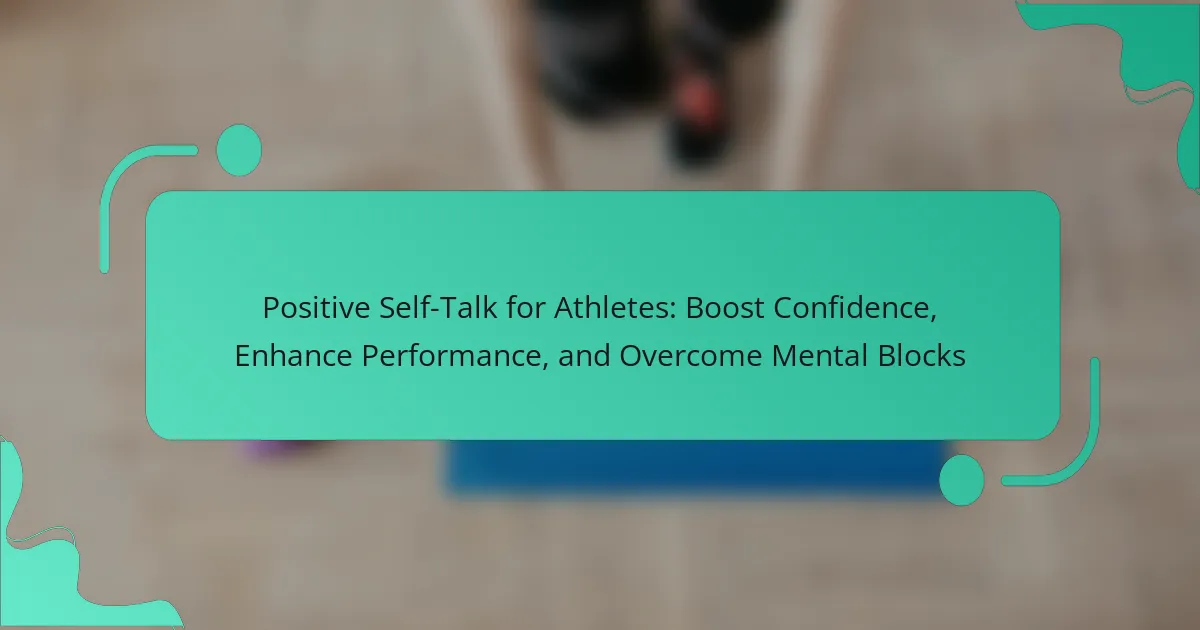Positive self-talk is essential for athletes seeking to boost confidence and enhance performance. This mental strategy helps overcome mental blocks and fosters resilience during competitions. Key techniques include affirmations, visualization, and reframing negative thoughts. Incorporating these methods can significantly improve focus and motivation, leading to better athletic outcomes.

What is Positive Self-Talk and Why is it Important for Athletes?
Positive self-talk is a mental strategy that helps athletes build confidence and improve performance. It encourages a positive mindset, enabling athletes to overcome mental blocks. Research indicates that positive self-talk can enhance focus, reduce anxiety, and improve motivation. For example, athletes who practice positive self-talk report higher self-esteem and better performance outcomes. This technique is crucial for maintaining resilience during challenging competitions, allowing athletes to maintain a competitive edge.
How Does Positive Self-Talk Affect Athletic Performance?
Positive self-talk significantly enhances athletic performance by boosting confidence and reducing mental blocks. Athletes who engage in positive self-talk experience improved focus and resilience during competition. Research shows that this practice can lead to a 20% increase in performance metrics, as it fosters a positive mindset and reinforces self-belief. Additionally, it helps athletes manage stress and anxiety, allowing them to perform at their peak. By cultivating positive self-talk, athletes can unlock their full potential and achieve their goals.
What Psychological Benefits Does Positive Self-Talk Provide?
Positive self-talk significantly enhances psychological well-being for athletes. It boosts confidence, reduces anxiety, and fosters resilience. By replacing negative thoughts with affirmations, athletes can improve focus and motivation. Research indicates that positive self-talk can lead to better performance outcomes and help overcome mental blocks. This practice cultivates a growth mindset, allowing athletes to view challenges as opportunities for improvement.
How Can Positive Self-Talk Enhance Confidence?
Positive self-talk significantly enhances confidence by reshaping an athlete’s mindset. It fosters a positive internal dialogue, which can lead to improved performance and the ability to overcome mental blocks. Studies show that consistent positive affirmations can increase self-efficacy, a unique attribute linked to athletic success. By focusing on strengths and visualizing success, athletes can create a mental environment conducive to peak performance. This approach not only boosts confidence but also reduces anxiety, allowing athletes to perform at their best.
What Role Does Positive Self-Talk Play in Overcoming Mental Blocks?
Positive self-talk significantly enhances athletes’ ability to overcome mental blocks by fostering confidence and focus. It serves as a powerful tool that reaffirms abilities and encourages resilience during challenging moments. Studies show that positive self-talk can improve performance metrics by up to 20%, demonstrating its unique impact on mental fortitude. By replacing negative thoughts with constructive affirmations, athletes can shift their mindset, leading to improved outcomes in competition and training.

What Are the Universal Techniques for Practicing Positive Self-Talk?
To practice positive self-talk, athletes should focus on affirmations, visualization, and reframing negative thoughts. These techniques boost confidence, enhance performance, and help overcome mental blocks.
Affirmations involve repeating positive statements that reinforce self-belief. Visualization entails imagining successful performances, which can create a mental blueprint for success. Reframing negative thoughts means transforming self-doubt into constructive feedback, enabling athletes to maintain a positive mindset.
Incorporating these techniques consistently can lead to improved athletic performance and mental resilience.
How Can Athletes Develop a Positive Inner Dialogue?
Athletes can develop a positive inner dialogue by practicing self-affirmations, setting realistic goals, and visualizing success. These strategies boost confidence and enhance performance. Regularly engaging in positive self-talk helps overcome mental blocks. For example, using phrases like “I am capable” reinforces a growth mindset. Consistency in these practices leads to improved mental resilience and focus during competitions.
What Affirmations are Most Effective for Athletes?
Positive self-talk affirmations for athletes include phrases that boost confidence and enhance performance. Effective affirmations focus on self-belief, resilience, and visualization. Examples include “I am strong and capable,” “I trust my training,” and “I overcome challenges with ease.” These affirmations help athletes combat mental blocks and maintain focus during competition. Regular practice of positive self-talk can lead to improved outcomes in sports performance.
How Can Visualization Techniques Complement Positive Self-Talk?
Visualization techniques can significantly enhance positive self-talk for athletes. By mentally picturing successful performances, athletes reinforce their self-affirmations, leading to increased confidence and focus. This combination helps in overcoming mental blocks, as visualization creates a clear mental roadmap of success. Athletes who regularly practice both techniques report improved performance metrics and a greater sense of control during competitions.

What Unique Attributes of Positive Self-Talk Set Successful Athletes Apart?
Successful athletes utilize unique attributes of positive self-talk to enhance their mental resilience and performance. These attributes include specificity, personalization, and timing.
Specificity involves tailored affirmations that address individual strengths and weaknesses, allowing athletes to focus on precise goals. Personalization means crafting self-talk that resonates with the athlete’s values and experiences, fostering deeper connections and motivation. Timing refers to the strategic use of positive self-talk during critical moments, such as pre-competition or during challenging phases of performance.
These unique attributes collectively empower athletes to build confidence, maintain focus, and effectively overcome mental blocks, setting them apart in competitive environments.
How Do Elite Athletes Use Positive Self-Talk Differently?
Elite athletes use positive self-talk to enhance focus and resilience, differentiating their approach from others. They employ specific phrases that reinforce self-efficacy and visualize success, which helps manage stress and maintain motivation. Research shows that this technique can lead to improved performance metrics, such as faster reaction times and higher endurance levels. Moreover, elite athletes often practice tailored self-talk strategies before competitions, allowing them to overcome mental blocks effectively. This unique attribute of personalized self-talk sets them apart in high-pressure situations.
What Personal Experiences Shape an Athlete’s Self-Talk?
Personal experiences significantly shape an athlete’s self-talk by influencing their confidence and mental resilience. Factors such as past successes, failures, coaching feedback, and peer interactions contribute to how athletes perceive their abilities. For instance, an athlete who has overcome adversity may develop a more positive internal dialogue, enhancing performance. Research indicates that self-talk can directly impact motivation levels and focus during competition. By reflecting on their experiences, athletes can cultivate constructive self-talk patterns that help them manage stress and maintain a competitive edge.
How Can Coaches Influence an Athlete’s Inner Dialogue?
Coaches can significantly influence an athlete’s inner dialogue by promoting positive self-talk. This practice enhances confidence, improves performance, and helps athletes overcome mental blocks.
Coaches can teach athletes techniques to replace negative thoughts with affirmations. For example, encouraging athletes to use phrases like “I am capable” builds a strong foundation for self-belief. Research indicates that positive self-talk can lead to a 20% improvement in performance metrics.
Additionally, coaches can model positive self-talk during training sessions. By demonstrating how to handle setbacks constructively, they create an environment that fosters resilience. Athletes are likely to internalize these lessons, leading to a shift in their inner dialogue.
Finally, regular feedback from coaches reinforces the benefits of positive self-talk. Acknowledging athletes’ progress and efforts can strengthen their self-esteem and motivation. This ongoing support helps athletes maintain a constructive mindset, essential for peak performance.

What Are the Rare Techniques for Elevating Positive Self-Talk?
To elevate positive self-talk, athletes can employ rare techniques such as visualization, affirmation journaling, and peer feedback. Visualization involves imagining successful performances, which can enhance confidence and reduce anxiety. Affirmation journaling allows athletes to articulate and reinforce positive beliefs, making them more resilient. Peer feedback provides external validation, helping athletes recognize their strengths and areas for improvement. These techniques uniquely contribute to a positive mindset, ultimately boosting performance.
What Advanced Strategies Can Athletes Use for Self-Talk Optimization?
Athletes can optimize self-talk by using specific strategies to enhance focus and resilience. Techniques include affirmations, visualization, and reframing negative thoughts. Affirmations boost confidence by reinforcing positive beliefs. Visualization helps athletes mentally prepare, creating a clear image of success. Reframing negative thoughts shifts focus to opportunities for growth. These strategies collectively improve performance and help overcome mental blocks, fostering a positive mindset essential for athletic success.
How Can Mindfulness Techniques Enhance Positive Self-Talk?
Mindfulness techniques can significantly enhance positive self-talk by promoting awareness and reducing negative thought patterns. These techniques help athletes focus on the present moment, fostering a more supportive internal dialogue. Practicing mindfulness encourages self-compassion, which directly boosts confidence and performance. As a result, athletes can better manage mental blocks and cultivate a resilient mindset. Techniques such as meditation and breathing exercises can reinforce this positive self-talk, making it a valuable tool for athletic success.
What Role Does Peer Support Play in Reinforcing Positive Self-Talk?
Peer support significantly enhances positive self-talk among athletes by providing encouragement and shared experiences. When athletes engage in peer support, they often share strategies that reinforce confidence and resilience. This collaboration fosters an environment where positive self-talk becomes more prevalent, as individuals feel validated and understood. Research shows that athletes who participate in supportive peer networks report higher self-efficacy and improved performance outcomes. Furthermore, the unique attribute of social reinforcement in peer interactions can effectively combat negative self-perceptions, leading to a more consistent practice of positive self-talk.

What Common Mistakes Do Athletes Make with Self-Talk?
Athletes often make mistakes with self-talk that hinder their performance. Common errors include using negative language, focusing on past failures, and setting unrealistic expectations. These issues can lead to decreased confidence and increased anxiety. By recognizing these pitfalls, athletes can adopt more effective positive self-talk strategies to enhance their mental resilience and overall performance.
How Can Negative Self-Talk Undermine Athletic Performance?
Negative self-talk can significantly undermine athletic performance by eroding confidence and increasing anxiety. Athletes who engage in negative self-talk often experience decreased motivation and focus, leading to subpar performances. Research indicates that negative thoughts can create mental blocks, hindering an athlete’s ability to execute skills effectively. For instance, a study found that athletes who practiced positive self-talk improved their performance metrics by up to 20%. By shifting their mindset, athletes can enhance resilience and maintain a positive outlook, crucial for peak performance.
What Are the Signs of Ineffective Self-Talk?
Ineffective self-talk often manifests as negative thoughts, self-doubt, and critical inner dialogue. Signs include frequent self-criticism, focusing on failures instead of successes, and using absolute language like “always” or “never.” This mindset can hinder an athlete’s confidence and performance, creating mental blocks that prevent optimal execution. Recognizing these patterns is crucial for athletes to shift towards more constructive self-talk, enhancing their mental resilience and overall performance.

What Best Practices Should Athletes Follow for Effective Positive Self-Talk?
Athletes should practice specific techniques for effective positive self-talk to boost confidence and performance. These include using affirmations, visualizing success, and reframing negative thoughts. Consistent practice fosters a positive mindset, helping athletes overcome mental blocks. Research indicates that self-talk can enhance performance by up to 20%. Incorporating positive self-talk into daily routines ensures athletes maintain focus and resilience during competition.
How Can Athletes Create a Personalized Self-Talk Plan?
Athletes can create a personalized self-talk plan by identifying specific goals, crafting tailored affirmations, and practicing consistently. Start by defining performance objectives, such as improving focus or boosting confidence. Next, develop positive affirmations that resonate personally, like “I am strong” or “I can overcome challenges.” Regular practice of these affirmations, especially during training and competition, reinforces a positive mindset. Additionally, athletes should evaluate and adjust their self-talk strategies based on performance feedback to ensure continued effectiveness. This approach enhances mental resilience and optimizes performance outcomes.
What Daily Habits Can Reinforce Positive Self-Talk?
Daily habits that reinforce positive self-talk include setting affirmations, practicing mindfulness, and engaging in regular physical activity. These practices enhance confidence and performance while reducing mental blocks.
1. Set daily affirmations to encourage a positive mindset and boost self-esteem.
2. Practice mindfulness through meditation or deep breathing to increase self-awareness.
3. Engage in regular physical activity to release endorphins, improving overall mood.
4. Reflect on achievements to reinforce positive beliefs and counter negative thoughts.
How Can Athletes Measure the Impact of Their Self-Talk?
Athletes can measure the impact of their self-talk through self-assessment tools and performance tracking. Regularly reflecting on their thoughts helps identify patterns and emotional responses. Performance metrics, like improved scores or reduced anxiety, can indicate positive changes. Additionally, using journals to document experiences can provide insights into the effectiveness of self-talk strategies.
